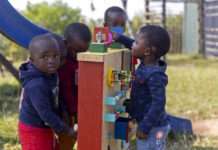
In South Africa, the Deaf community faces unique challenges including neglected mental health and access to care. Often overlooked and marginalised, this community grapples with a host of emotional, psychological, and societal issues that can significantly impact their well-being.
According to the World Health Organization over 1.5 billion people, nearly 20% of the global population, live with hearing loss whilst 430 million of them experience disabling hearing loss. Researchers project that by 2050, the number of individuals with disabling hearing loss could surge to over 700 million.
Within South Africa, a staggering 12 million people contend with some form of hearing loss which has a devastating impact on the individual manifesting in academic difficulties, heightened unemployment rates, poorer general health and social isolation. The Deaf community, like any other, is not immune to mental health challenges, with depression, anxiety, and substance abuse being common adversaries.
Dr Ian Westmore, a board member of the South African Society of Psychiatrists, underscores that one of the most prominent obstacles facing the Deaf community is communication.
“Despite Sign language being one of the nation’s 12 official languages, it remains largely unrecognised and unspoken by most hearing individuals. This lack of proficiency extends to medical professionals, creating a significant hurdle for deaf individuals in expressing their emotions, thoughts, and feelings. This lack of communication can breed isolation, frustration, and exacerbate pre-existing mental health conditions.”
He says there is a glaring lack of awareness among healthcare providers and policymakers regarding the unique mental health needs of the Deaf community. This oversight has resulted in the underdevelopment and inadequacy of services tailored to their specific requirements.
Dr Westmore emphasises, “The mental health challenges faced by the Deaf community are fundamentally distinct from those of the general population. Healthcare professionals must account for gaps in knowledge and emotional vocabulary, cultural backgrounds, and the inability to communicate mental health symptoms.”
“Communication within the Deaf community presents its own set of challenges. In many cases, certain mental health concepts cannot be adequately conveyed through Sign language alone. Lip-reading often falls short, and written communication cannot fully substitute spoken language. Additionally, the availability of interpreters proficient in Sign language is limited, further complicating matters. Interpreters can, in addition, inadvertently introduce barriers that hinder the expression of emotions, ultimately leaving individuals feeling uncomfortable or misunderstood.”
“Without proper methods for assessing mental health conditions, there is a risk of incorrect diagnosis and treatment or even undiagnosed conditions.”
In addition to the communication barrier, stigma remains a harsh reality for many Deaf individuals. Social stigmatisation and discrimination frequently plague the Deaf community, leading to issues such as low self-esteem, anxiety, and depression. Access to crucial information and resources is also severely limited, impeding early intervention and support.
For those born deaf, Dr Westemore says early life stressors associated with the disability can exasperate mental health conditions later in life.
“The inability to communicate and participate in conversations, linguistic neglect, poverty, trauma and abuse can influence a child born deaf’s functioning and stress response which, in turn, impacts how they cope with stressors in adulthood.”
“Access to quality education is another challenge, particularly for deaf children in South Africa. This educational disadvantage can lead to lower socioeconomic status and heightened stress, contributing further to mental health issues.”
Additionally, there are varying degrees of deafness, including those born with the disability and individuals with sensorineural hearing loss due to inner ear damage or age-related factors.
“Sensorineural hearing loss, one of the most common types of age-related hearing loss, is often overlooked but significantly diminishes the quality of life. It leads to feelings of isolation, reduced social activity, and a sense of exclusion, culminating in a higher prevalence of depressive symptoms.”
Dr Westmore underscores that addressing mental health within South Africa’s Deaf community is an urgent matter requiring both acknowledgment and action.
“It is vital that society recognises the unique challenges faced by Deaf individuals and takes proactive steps to address them. By breaking down communication barriers, improving access to mental health services, and raising awareness, we can ensure that the Deaf community in South Africa receives the support and care they deserve, ultimately improving their overall mental well-being.”
Dr Westmore offers several potential solutions:
- Training of medical professionals: GPs and clinics are in many instances the first point of call for patients. Healthcare providers need to be trained in basic Sign language to help bridge the communication divide and improve the quality of care for Deaf individuals.
- Deaf-friendly mental health services: Specialised mental health services designed to cater to the Deaf community should be established, providing a safe and welcoming environment where individuals can seek help without fear of miscommunication or discrimination.
- Awareness campaigns: Initiatives to raise awareness about the mental health challenges faced by the Deaf community are essential. These campaigns can help reduce stigma and foster greater understanding among the general population.
- Community support: Peer support groups and community organisations can play a crucial role in providing emotional support and resources for Deaf individuals struggling with mental health issues.
- Education: Mental health providers need a deeper understanding of hearing loss, its association with psychiatric disorders, and the treatment of these disorders. Accurate diagnoses hinge on healthcare professionals’ familiarity with the unique challenges faced by the Deaf community and the profound impact of hearing loss on their lives.
- Checklists: All healthcare professionals should be equipped with symptom-based checklists that the Deaf person or their family member can complete, keeping in mind poor literacy and educational attainment.
- Careers in mental health: Encouraging members of the Deaf community to consider careers in mental health can help bridge the gap in accurately diagnosing conditions and providing culturally sensitive care.
For additional resources and to seek support the Deaf community and their family members can reach out to:
South African National Deaf Association
National Institute for the Deaf











